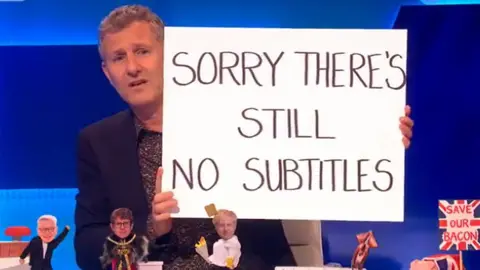C4 subtitle problems breached licence conditions, Ofcom finds
 Channel 4
Channel 4Channel 4 breached its broadcast licence conditions after viewers had to go weeks without subtitles, signing or audio description, Ofcom has found.
The media watchdog said the channel missed its subtitles quota on Freesat for 2021, after a fire at a broadcast centre affected services last autumn.
Channel 4 said it was "very disappointed with Ofcom's decision and will review its findings carefully.
"We would like to apologise once again to our audiences for the disruption."
The channel's statement added that since "the catastrophic incident last September... we have implemented a number of new systems and processes to avoid a serious incident in the future."
Channel 4 had breached another condition of its licence by failing to effectively communicate with affected audiences.
No information about the outage was given to viewers for 12 days.
Ofcom described Channel 4's communication with audiences during the incident as "severely lacking". The BBC has asked Channel 4 for comment.
Access services are relied on by millions of people to watch and listen to television, including those who are deaf, have hearing loss, are blind or partially sighted.
Ofcom also conducted a broader review of the incident last autumn, which has highlighted an urgent need for all broadcasters to improve and audit their disaster recovery plans.
What happened?

Hundreds of hours of Channel 4 programming were affected by the outage, which began when fire suppression devices destroyed hard disks at a west London broadcast centre last September.
The incident at the centre, owned by Red Bee Media, affected other broadcasters like the BBC and Channel 5, although their services were restored sooner.
Channel 4 was the worst affected, with an extended outage of its access services on its broadcast channels that began on 25 September 2021 and was not fully resolved until 19 November 2021.
Ofcom found that Channel 4's ability to respond to the technology failure at Red Bee was not sufficiently resilient, with its back-up subtitling system failing. It took four weeks for subtitles to be restored on Sky, Freeview, Youview and Virgin Media. It was another four weeks before subtitles were restored on Freesat.
As a result, Channel 4 fell short of its annual quota to subtitle 90% of programmes on Freesat - achieving only 85.41% - in breach of its licence conditions.
Ofcom received about 500 complaints and launched an investigation earlier this year.
What did C4 tell its viewers?
Ofcom found serious failings and delays in Channel 4's communications with affected audiences.
Channel 4 did not provide any information about the cause of the outage or steps being taken to resolve it for 12 days following the incident.
On-screen TV guides included inaccurate information about the availability of Channel 4 access services until 14 October 2021, nearly three weeks after the outage began.
Deaf viewers were likely to be among those most impacted by the outage, but Channel 4 did not provide any information to viewers in British Sign Language until 15 October.
Nor did it broadcast any on-air advice or information about the outage until that date, when it issued a statement which read: "Channel 4 would like to apologise to viewers for not currently being able to provide access services. We realise how frustrating this is for our viewers."
Audiences who did not have access to Channel 4's online information would have had no understanding about the scale of the issues or that the company was working to rectify them.
Ofcom said it was particularly concerned about the impact on older, blind, or partially sighted access services users, whose access to online information may be more limited.
What happens now?
Channel 4 must now report to Ofcom by the end of this year on the steps it has taken to ensure greater resilience of its access services, as well as how it is continuing to improve the accessibility of its programmes.
Ofcom said it recognised that the Red Bee incident was "unprecedented" but following its review, the watchdog has made a number of recommendations broadcasters are expected to act on.
Broadcasters must improve their disaster recovery plans and processes, with regular testing carried out under simulated emergency conditions.
They must also prepare effective communication plans in case of service interruptions. This includes taking into account the particular needs of the affected audience, and making use of their own TV channels and not just social media to communicate with them.
Teri Devine, associate director for inclusion at RNID, said in a statement: "Deaf viewers and viewers with hearing loss were left excluded and frustrated, and this was made worse by a lack of accessible communication explaining what had happened and when the problem would be fixed.
"We are pleased that Channel 4 have taken steps to prevent this crisis from happening again, and that they have since committed to subtitling 100% of content on All4 and increasing signed content."
The Royal National Institute of Blind People (RNIB) said the issues caused by the disruption last autumn highlighted "the importance of access services such as audio description on broadcast and on-demand content for blind and partially sighted audiences".
"We are pleased to see Ofcom's investigation into what went wrong and welcome the recommendation that all broadcasters implement more robust plans to prevent such lengthy disruption to accessible programming in the future," an RNIB spokesman said.
"Audio description enables blind and partially sighted viewers to enjoy the same programmes as anybody else and we will continue, alongside RNID, to call on the government to introduce targets for accessible content for on-demand broadcasting."
